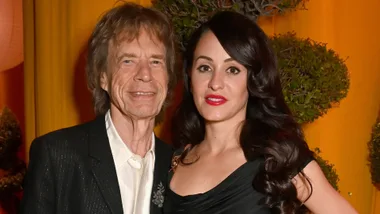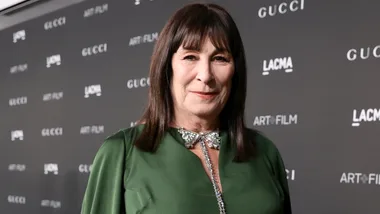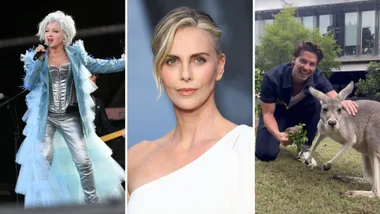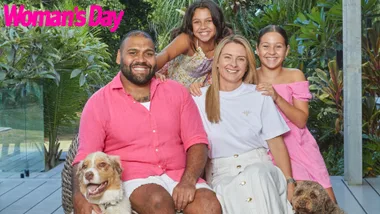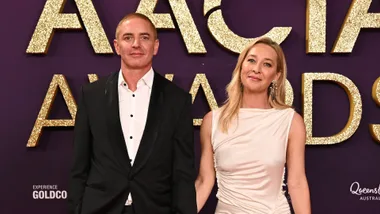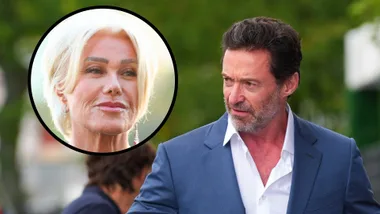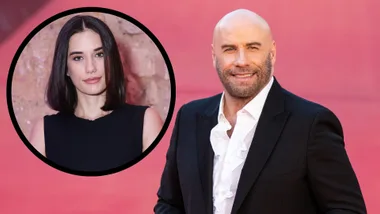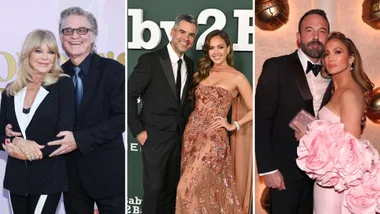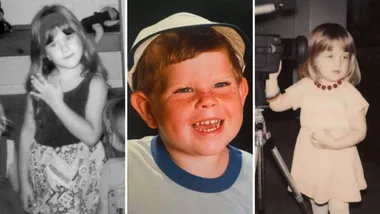Jojo Moyes’ new book, The Peacock Emporium (Hodder & Stoughton) has been selected as the Great Read in the June issue of The Australian Women’s Weekly.
**Q Congratulations on The Peacock Emporium, I really loved it!
A** Oh, did you? It is a bit deeper and darker than my previous books and I was a bit worried because it gets a bit brutal in the middle, but everyone who has read it so far seems to have really loved it.
**Q I felt the bit of darkness gives the story more density – depth?
A** Yes I agree with you. It’s odd though because some people you find, after Sheltering Rain (Jojo’s debut novel), they want you to write the same book again and again and I’ve had a lot of people say about the second one, ‘Oh! It’s very different.’ Well (laughing) and what do you want me to do?
**Q What kind of story did you want to write with The Peacock Emporium?
A** The Peacock Emporium almost happened by accident. I was signed to a two book deal by Hodder and the second of those books was the book I’m on the last part of now, called Ship of Brides. It is based on a true Australian story. My Grandmother is Australian. She was an Australian war bride. And the fictional story of her voyage over here was an extraordinary one. (It wasn’t like a normal war bride voyage). I really wanted to write this book which I had in my head but I knew it would be a huge book in terms of research so I kind of wasn’t ready to write it. So I thought I’d do the other book for Hodder first. I had in mind a light book and part of it was based on my times spent in a local coffee shop in my local town. Because I work from home I get quite lonely, and I found there was this odd little shop, part florist, part curio shop, part coffee shop where the town’s oddballs tended to congregate. And I found I’d end up there every lunchtime just chatting away to all these other freelance people and people who spent a lot of time by themselves. What I found is that the longer you sat in the shop, the more extraordinary the stories you heard. Some quite filthy! (laughing) I live in a quiet country market town and I heard some things in there which were quite shocking and it got me thinking about how Sophie who ran the shop, might not always want to hear some of the things that she had to hear as a kind of hostess. It got me thinking about the way people congregate and talk and I loved the identity of the shop which became a magical place that people came to depend on. So it started off as this quite light story and then it just grew and grew and grew and got bigger and deeper and darker and took in everything, from the riots in Argentina to modern marriage and how people get disappointed and don’t know what their expectations should be. And it became a much bigger book than I’d intended. So from thinking I was going to have almost a breather before my big Australian book, suddenly this thing took on a whole momentum of its own.
**Q Interesting how the local coffee shop sparked it all off?
A** Yes I think having a journalist history helped with that.
**Q You worked as arts and media commentator on The Independent Newspaper in the UK?
A** The useful thing about journalism is that it teaches you to shut up and listen and that is a really good tool as a writer because frankly I feel I could have a conversation with anyone and I think I could come out of it with a book at the end of it. There’s always something that is going to trigger you off.
**Q Do you get into trouble with your husband for listening into other people’s conversations when you are out?
A** (Laughing) It’s funny, my friends and family are quite cagey around me sometimes. Although I wouldn’t write anything about them. Mind you, people do see things in your writing you might not have intended and it makes me question myself quite hard: Is this a story I picked up sub-consciously? Is it something I should be using at all? And there is always this dilemma, between what you should do as a writer, which is basically quite a detached assessment of the way people’s feelings work and of the way people’s lives have spun out. And also your human, protective side which doesn’t want to use people’s situations to your own end. I find I struggle with that one still.
**Q People have a dread of being put into a book, don’t they?
A** Oh absolutely, but the flip side to that is that often people don’t recognise themselves at all. In fact my second book was inspired by a friend of mine who lies compulsively and she got me thinking about how lies can impact on people and how they might last 20 or 30 years. And I knew as I was writing this book that there was no way she was ever going to recognise herself because people don’t want to see the bad side of themselves, anyway. And she probably doesn’t even think she lies. The rest of us who have known her for 20 or 30years have never even challenged her.
**Q As arts and media correspondent, what kinds of things did you cover?
A** Everything, you never knew what you were doing from one day to the next. In fact it always makes me laugh because on the day I finally found I’d got this book deal at an auction, I was working at the newspaper, 6 months pregnant and as sick as a dog. The story I was given was about Jamie Oliver discussing the best way to stuff your turkey. So I was sitting there, my agent on one phone saying, ‘it’s just gone up to such and such an amount, you can write books for a living!’ And my news editor at the paper coming over to and saying, ‘come on, what is it – balls up it’s rear end or what?’
**Q You set out to be a Martin Amis, tried the voice and it didn’t work, but something in you made you not give up. I read that when you were pregnant and sick, you sent off 3 chapters of a completely different kind of book? And that one grabbed everyone?
A** I wrote 3 books in my spare time, such as it was, before I wrote Sheltering Rain. I think I was teaching myself to write because I’d never done an English degree or anything like that. Like a lot of people I just wanted to see if I could do it. If I could get to the end of a book. And then once you’ve done it, it’s not enough, you want to get it into print. I guess I was writing chick lit before it really hit the stands. But it was more male kind of writing. Sharper, more urban, clever, witty and no emotions came into it. I think it was partly a reaction to working in journalism, it’s a very macho world. You don’t show your feelings and you don’t show weakness. I worked in that world an awful long time and I grew up in a macho world, as my dad had a fleet of lorries. So I grew up around lorry drivers. I don’t know, I suppose female emotions felt like an anathema to me. But the bottom line is they weren’t getting published. Everyone liked the writing but they all said the same thing, too romantic for the male market and too political for the female market. I was very indignant at the time. Then I got very sick with Harry. It was morning sickness but all day and all night. I was on instant mashed potato every three hours for weeks on end. I can’t look at a packet of mash now without feeling sick. I was pretty depressed. My husband took me away on holiday to Cornwall and I had a couple of books, chick lit things which I threw down in disgust. Then I picked up a Maeve Binchy in a shop. I thought ‘I won’t enjoy this, it’s kind of old lady fiction.’ And I was really impressed by it. I thought, it has a real story, it’s full of humanity and I guess it made me realise that feeling emotions in a book weren’t necessarily something to be ashamed of. Perhaps with a bit of that in mind I started Sheltering Rain. I sent 3 chapters of it off to my agent and then had a complete crisis of confidence and thought why did I do that? I sent an apologetic email to her and it was funny, she had laryngitis at the time and she sent me an email back that read in capital letters, MORE! Ultimately it went off to 7 publishers and I think 6 of them bid. I suddenly realised that that was the thing that could work for me. Lots of publishers were looking for something like that because the big saga writers, Rosamunde Pilcher, Binchy, Elizabeth Jane Howard, were talking about writing their last books and there were an awful lot of publishers going, ‘oh, crikey!’ So it was my good fortune to pick up that Maeve Binchy. I think it is about timing as much as anything.
**Q I think a lot of people under-estimate Maeve Binchy as a writer?
A** Yes I have a lot of respect for her and it’s like a quality anything, you pick up one of those books and you know exactly what you’re going to get and I mean that in the best sense, not in any derogatory way. I don’t write like her. I think I have a slightly younger, slightly darker take on some things. Still, some of her books are about some pretty tough subjects. Madness and loss and death and so on. I think some Rosamunde Pilcher book I read killed off some angelic child in the first couple of chapters. I thought ok, right, this is not quite cosy teapots and fluffy slippers.
**Q Is that a baby I can hear in the background?
A** No I’m afraid it is a cat. We took in a cat from an animal rescue home, but she’s turned out to be the noisiest animal I’ve come across.
**Q I’ve got two kittens here who are playing up something terrible while I do this interview, so if I sound a bit distracted at times, forgive me.
A** Oh God, 2 kittens! Good luck! How did you get 2?
**Q I didn’t really realise what I was doing at the time.
A** I know that feeling, that’s how I’ve ended up with 2 horses, Ben and Wiggles and chickens and a cat.
**Q You live in a semi rural area?
A** We’re very rural. We don’t even appear on some maps. When I got my first book deal and I was still pregnant with Harry we moved out of London. It was a good excuse, we’d been desperate to do it for ages.
**Q What’s the size of your land?
A** About 3 acres. By your standards it would be an allotment, but as British land goes, it’s pretty nice.
**Q Do you live in a cottage?
A** We live in a Victorian red brick house, next to a duck farm (laughing). It’s called the Vine House because it had a vine growing all over the inside of it, in the conservatory.
**Q You have two children?
A** Yes Saskia is 6 and Harry is 3.
**Q What’s your background – your Dad owned lorries?
A** It wasn’t a straightforward trucking company, it was a fine art removal company. He used to install exhibitions at the Parliament and Buckingham House and stuff. The best part of it for me as a child was he had these huge warehouses where you could store art and he used to store a lot of Paul McCartney’s stuff, so I’d be wondering around as a 10 year old, in Sergeant Pepper uniforms or past a David Hockney. And to me, it would be completely normal. But it was a great place to get lost and use your imagination.
**Q Where did you grow up?
A** In London, I was a real city kid, knew the whole of the London bus network, off by heart. I mainly lived in Hackney which was an unlovely eastern, inner-city part of London. But I bought a horse very early when I was 14 and I used to keep it in a funny little old yard behind Hackney Town Hall and ride him around the London parks. I think my parents (laughing) realised then that I was someone who was going to get my own way, one way or another.
**Q Siblings?
A** My parents re-married when I was in my early teens, so I now have 2 half-sisters on my dad’s side, aged 12 and 14, a half-brother on my mum’s side who is 14 and 2 step-brothers on my step-dad’s side who are in their 40’s. So having been an only child till I was 19, I now have this odd, but wonderful extended family. We’re all pretty close.
**Q Were you a difficult teenager?
A** I think I was probably your bog standard horrible adolescent. My mum always says that if my worst form of rebellion was working for peanuts in a mini cab office, that was pretty ok. I think if you know you’re loved you come back to the fold pretty quickly. Plus my parents and my step-dad are pretty impressive people. I think you’re lucky to be able to admire your parents as well as love them.
**Q Mother’s occupation?
A** Illustrator of children’s and adult books and magazines. She’s probably most famous for her illustrations on a brand of Yorkshire tea which has become a best-selling tea caddy. So my parents were both involved in different sides of the art world. But I went into words, just refused to go into pictures and therefore, into competition with them.
**Q (To the kitten) Lily, STOP IT! Sorry Jojo!
A** That’s alright, it’s quite comforting, sounds like my house.
**Q How long have you been married?
A** Six years this year. We’ve been together for 8. He’s the technology editor of The Independent and his name is Charles Arthur.
**Q Back to the Peacock Emporium, I loved the character, the rich and spoiled Athene and wondered what inspired her?
A** In journalism you’re so afraid of exaggerating things. So if anything I think my fiction plays it a bit safe when it comes to character. I’m wary of doing people who are too extreme. I just wanted to create someone who was a bit larger than life and quite naughty and once you start writing those sorts of people you often find they take off with the book. They are so enjoyable to write and often, the best sorts of characters don’t necessarily do what you expect them to do. Athene was such fun to write because she was all the things I would love to be in my late teens had I had half the guts to do it. There’s a scene where she rides that horse into the party and I could see every second of that scene. It’s all there in a picture in your head and all you’re doing is joining the dots on the paper. What I really don’t want to do is to create a two dimensional baddie. People are never that simple. What I feel about life in general is that most people tend to believe that they are good people doing the right thing, no matter what damage they do. (Look at Tony Blair!) It would have been too easy to hate Athene. To just make her an out and out selfish person. I enjoy subverting the reader’s expectations and also writing that last scene with Athene made me weep because as a mother, what she was doing even if she was the hardest most selfish person in the world, made me cry. I think to write your characters you have to inhabit them to a certain extent. I’d have to go away for half an hour before I could come back to another character, because I’d need to be in them and they have a different way of speaking and thinking and behaving. Sometimes you need to create physical space.
With Athene I felt that she needed to haunt the whole book as well, which I think she did both physically through her portrait but also because it was such an extreme thing to do. I think anybody would be asking themselves the whole way through the story, how could she have done that? How could she have caused so much damage?
**Q The story also begins with the handing over of a baby in Argentina where the couple are too poor to keep their baby – what made you write this scene?
A** I have a friend who went to live in Buenos Aires and I was hearing from her a lot about what was going on there … And it was quite shocking to me to hear the level to which ordinary middle class people had sunk into this mire of poverty and political violence. And I guess once I started writing this book, (which is set in a cosy, market town not dissimilar to where I live), just because it is commercial fiction I didn’t want it to get too cosy.
I’m interested in the way we treat people who are outside of our own experiences. And Alejandro is so foreign, just by being there he makes people asks questions of themselves. Almost in the same way Athene did. I thought not just having him as a foreign love interest, but by taking the reader outside this cosy world into something a bit grittier, gave the book more meat so people could get their teeth into it. The books I like tend to take people to somewhere they’ve never been. The books I’ve been mad about have been about places I never have a hope of getting to, like Memoirs of a Geisha and the Alexander McCall Smith books – who’d have thought we’d be interested in a female detective in Botswana and we are all gripped! So I thought I’d include these little insights from that extraordinary time in Argentina’s history. Also when my friend told me about the mothers of the Disappeared in Argentina, it had a resonance about the loss of maternal love and this punctuated the beginning, middle and end by the handing over of the baby. It just seemed to fit together quite nicely.
**Q Are impoverished women in Argentina actually giving up their babies?
A** It has happened. And in Argentina’s history, up until 20 or so years ago, there has been terrible controversy over the stealing and handing over of babies.
**Q They were taken by the military, not given, weren’t they?
A** Exactly. But there was such poverty, with what was going on two years ago I thought it wasn’t a situation beyond the realms of possibility.
**Q You were born in 1969 – what month?
A** August 4.
**Q Leo then?
A** Yes.
**Q I’m asking this because we publish a fact file on you in the mag and I like to put some trivia in.
A** I know your magazine because of course my grandmother being Australian is familiar with it. You ran a review of my last book Foreign Fruit.
**Q Yes and we mis-named it Forbidden Fruit. Sorry!
A** (Laughing) I thought more people might have bought it!
**Q How old is your grandmother now?
A** She’s 82 and she’s going to be so excited when I tell her about this. She was thrilled enough when the Wagga Wagga Advertiser did a review of my book Sheltering Rain. My grandmother is such an inspiration. In fact she went to Russia two years ago because she’d never been. She’s that kind of a woman. She’s inspired two books now.
**Q What part of Australia did your Grandmother come from?
A** Waverley in Sydney. I’m coming next year to publicise my book, the one based on my grandmother’s experiences. I have to say Australia has been brilliant for me. I’ve just sold more and more in Australia so I’m really keen to get out there. I hope Peacock will appeal more to people than Sheltering Rain, because I realised that if you don’t like horses and hunting and mud and rain, you’re just going to be turned right off.
**Q That’s not true, I don’t like any of those things and I loved Sheltering Rain.
A** You know that was inspired by my grandmother and grandfather, because they got engaged after knowing one another only two weeks? He was a Scottish naval officer and they met at a party for the Royal Navy in Sydney in 1945. It makes you wonder how they managed to stay committed, having known one another only two weeks, then not seeing each for a year? Then aged 23 she left her family and came over to England where she knew noone except my grandfather.
She’s the most generous natured person I’ve ever met in my life. And I just thought, ‘why did that generation feel able to make those sorts of commitments, when I can’t commit to a brand of hair conditioner! What is going on?’ And that’s sort of what started Sheltering Rain. Maybe we have too many choices? I don’t know.
**Q Is Jojo your real name or is it a nickname?
A** I’m Jo on my birth certificate but when I was born I was almost 3 months premature. My Mum was a massive Beatles fan and there was a song at the time called Get Back, which has a line in it about Jojo. And it apparently stuck.
**Q Where were you educated?
A** Two State schools and two private schools. I started at State (a little church one called St Mary’s) school and one day when Mum dropped in unexpectedly, she found I’d been left teaching the rest of the class while the teacher had gone out to have a fag or something. She took me out of school that same day. Then I went to a strange new private school where there were only about 8 pupils. It was run by a very progressive teacher who we called Mog. And it was the making of me. It was very creative and it felt very safe for a child who’d grown up in quite a rough area. And through being there I managed to get into good private schools for my secondary education. And I went to London’s School For Girls, one of the top girls’ schools but I’m afraid I didn’t do very well there because it was kind of rigid, very formalised. It wasn’t me. I managed to get my ‘O’ levels but then I left and went to a State school, Camden School For Girls, to get my ‘A’ levels. It’s quite well known in the English education system for raising quite Bolshie, creative girls. Emma Thompson went there, so it’s that kind of a gel really. By the time I left there I was truanting regularly and just being a real teenage pain so I went off after that and got a job.
**Q What as?
A** A mini cab controller in a mini cab office. Then I went to a bank typing statements in Braille for blind people. I can still read Braille. So I did that for about 18 months and then I went to work for a notorious holiday company called Club 18-30. Basically holidays for wild young things. My job was to go over with a photographer and write about hotels and try to persuade punters, sorry customers, to arrange themselves nicely for photos for a brochure. Which taught me a great deal about tact, diplomacy and how to hide a tattoo behind a pillar, so perhaps it wasn’t so bad after all.
**Q How did you get from there to The Independent newspaper?
A** At university I worked for a local newspaper, and from there managed to win a bursary awarded by The Independent to train young journalists. I basically moved into The Independent’s offices and made endless cups of tea until they agreed to take me on. In the end I was there nine years.
**Q Jojo loves..?
A** Riding my horse, goofing around with my kids, I don’t know, I’m just grateful to be living a life I love. I really like writing. Maybe all those jobs gave me a good work ethic. I write 1000 words a day. Also, both my parents are incredibly hard working and built successful careers from nothing. My earliest memories are of sitting under my mum’s desk playing while she worked. She would paint at night and look after me in the day. I’m not entirely sure when she slept. My father built a multi-million dollar business, complete with royal warrant, from a bashed up old Renault van. I think I have inherited something of a Protestant work ethic from the two of them. Even when I was working long days at The Independent, I would come home, put my daughter to bed, eat supper and then do a couple of hours writing. I think anyone who suffers serious writers’ block hasn’t done enough crappy jobs.
**Q First person to read your manuscript?
A** My husband, whose a hard critic but a very good one. I should add I couldn’t do any of this without an understanding husband. The domestic side of life tends to suffer when I get ¾ into a book. And I ALWAYS fall in love with my leading men, although I think he feels it’s a pretty safe sort of infidelity.
**Q Finish the sentence, Jojo dislikes
A** Cruelty, plastic surgery, mucking out the stables every morning, not having an extra two hours in the day.
**Q And Jojo thinks..
A** The harder I work, the luckier I get.

